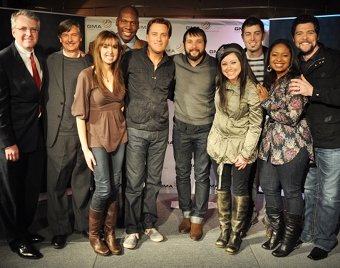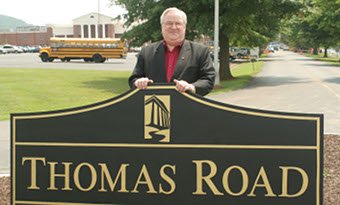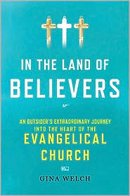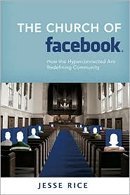A Time to Laugh
“For every thing there is a season, and a time for every purpose under heaven … a time to weep and a time to laugh,” according to the Old Testament book of Ecclesiastes.
What is the role of laughter and humor for Christians? When should believers take time to laugh?
Humor takes several forms—from stand-up comics to cartoons to clowns to storytelling. Many Christians who practice some form of humor believe God granted them the opportunity to use it to enhance believers’ lives and to draw other people to Christ.
“God makes his people happy, and happy people love to laugh,” cartoonist Joe McKeever said, pointing to Psalm 4:7. “Laughter is a tension-reliever, an anger neutralizer, the best icebreaker and one of the sweetest sounds on the planet.”
“Humor is a godsend that we as human beings need to give one another,” said Joel Goodman, founder and director of the Humor Project, a Sarasota Springs, N.Y., organization that offers humor resources, training and life coaching.
Laughter and humor cause physical changes that enhance people’s lives, which can help defuse tension.
“Laughter relaxes the whole body, carries more oxygen to cells and tissues and increases cardiac output,” explained Day Lane, a registered nurse in Kansas City, Mo., who is completing a doctor of philosophy degree in religious studies and sociology and has taught at Central Baptist Theological Seminary.
“So, you can imagine with an atmosphere relaxed by a little humor and more blood flowing in everyone’s brain, the possibility for creative solutions to tough problems opens up.”
Motivational speaker Steve Kissell of Norfolk, Va., uses humor as a natural part of all types of speaking engagements, including to government entities, education and industry. Humor can be a “gentle reminder” to make sure his listeners do not forget God as they work, he said.
Sharing the gospel
A comedian for almost 15 years, Chonda Pierce currently serves as president of the Christian Comedy Association. She sees comedy as an effective means of reaching out to people.
“The greatest tool comedy has been for me is the way that it opens an audience up to receive—no matter if the motivation for a particular event is soul-winning, information or just clean entertainment,” she said. “I have seen comedy allow an audience to bond and to sit up and take note of a truth that was on my heart to share.”

Chondra Pierce
|
Junior the Clown—a.k.a. Tony Jones of Mansfield, Ga.—loves to make people laugh while presenting the gospel. He sees clowning as a way to reach people who might not attend traditional worship services.
“There has been more than one instance that an individual has heard something we have presented that they had not gotten before,” he said. “I believe that there are a lot of ways to preach the gospel and that different people hear different things, depending on how it is presented.”
Meeting life needs
Whether used as a sermon illustration or a remark that just pops out in response to stress, humor and laughter can help individuals deal with problems.
As director of missions in New Orleans when Hurricane Katrina hit, McKeever saw firsthand the balm humor could be. McKeever and up to 100 pastors met weekly as the city and its people dealt with the disaster and began to recover.
“Each person in the room was invited to address the others,” he explained. “When one had a funny story to tell, we welcomed it like the baked summer ground thirsts for water. Nothing was more welcome than a good laugh.”
Lane sees humor surface frequently in hospitals. “Sometimes the humor comes through people, especially children, to lighten some of the difficulties we bear,” she related.
 “For example, while working in the intensive care unit at a local hospital, my friend, Joan, took care of a middle-aged woman who died despite all the high-tech attempts to save her live. The death was unexpected and the family was in a state of shock.”
“For example, while working in the intensive care unit at a local hospital, my friend, Joan, took care of a middle-aged woman who died despite all the high-tech attempts to save her live. The death was unexpected and the family was in a state of shock.”
As the family tried to deal with details, a 4-year-old granddaughter, who had never been to a hospital, repeatedly asked: “Where’s Grandma? Where’s Grandma?”
Although family members reassured her several times that her grandmother had gone to heaven, the child continued to ask.
“Much to Joan’s dismay, the family … came into the room before Joan had a chance to remove the tangle of tubes, IV bags and machinery. … The little girl was dumbfounded. She looked, wide-eyed, at the room, the oxygen, the ventilator, the EKG machine and countless other items she had never seen before. She peered up at her mom and exclaimed incredulously, ‘This is heaven?’
“It was a profoundly therapeutic moment for both the family and the nurses.”
Humorous stories become teachable moments, as well. McKeever uses them whenever possible.
“Years ago, when brides and grooms sometimes wrote their own vows, a couple said to me, ‘We don’t want to say, ’Til death do we part,’” the former director of missions said.
“When I asked why, they said: ‘So many people say it and don’t mean it and end up getting divorced. We want to be honest.’
“I said, ‘What do you want to say?’ They said, ‘We want to say, So long as love shall last.’ I said, ‘Well, that’ll be about Tuesday.’”
Injecting humor allowed him to minister to that couple and to several couples since then.
“Some of the most creative leaders in church communities are brilliant humorists,” Lane added.
“Humor is effectively used to lessen tensions between parties in church disputes, troubled marriages and, heaven forbid, committee members.”
Use laughter and listen for the humor in others, Lane suggested. Then, watch God use those stories to minister.









